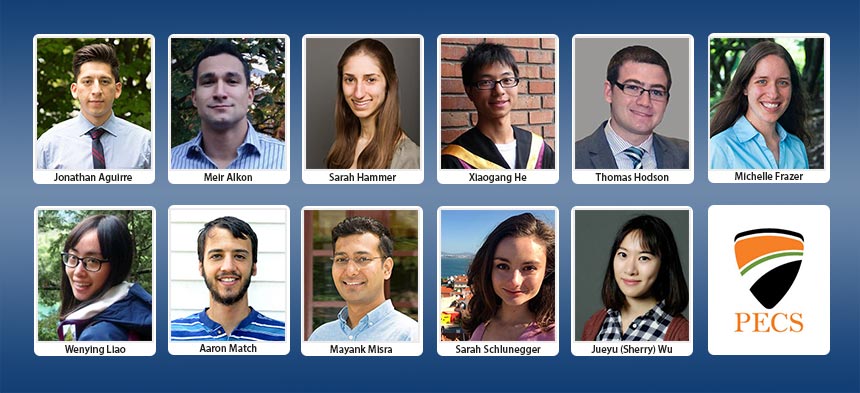Eleven graduate students join Princeton Energy and Climate Scholars Program
The Princeton Environmental Institute selected 11 new graduate students to join the Princeton Energy and Climate Scholars Program (PECS) for a two-year fellowship commencing this fall. The new fellows bring the total number of PECS scholars to 20.


The selected fellows and their academic programs are: Jonathan Aguirre, Spanish and Portuguese; Meir Alkon, politics; Sarah Hammer, chemical and biological engineering; Xiaogang He, civil and environmental engineering; Thomas Hodson, mechanical and aerospace engineering; Wenying Liao, ecology and evolutionary biology; Mayank Misra, Woodrow Wilson School; Jueyu (Sherry) Wu, psychology; and Michelle Frazer, Aaron Match and Sarah Schlunegger in the Program in Atmospheric and Oceanic Sciences.


Founded in 2008, PECS brings together a select group of talented and engaged Princeton Ph.D. students with research expertise from wide-ranging backgrounds. To date, 90 graduate students representing 17 Princeton departments and schools have participated in PECS, as have 26 faculty board members from 10 departments; current fellows represent 12 departments and schools.
“PECS provides a platform for Ph.D. students working on any aspect of energy and climate research to interact with, collaborate in, and gain a firsthand understanding of research areas outside of their own discipline, and broadens their horizons both as scholars and as citizens,” said Robert Socolow, PECS’ faculty coordinator and professor of mechanical and aerospace engineering, emeritus.
Scholars’ research interests include climate change and extreme weather, aerosols and cloud formation, terrestrial and oceanic nitrogen cycling, renewable energy and energy efficiency, hydraulic fracturing, energy policy in emerging economies, sustainable building materials, land use and forest restoration, tribal populations and human rights, public attitudes toward environmental issues, the history of American art and depictions of nature and the environment.
Aguirre said he wanted to join PECS to be part of a community of students engaged in bridging disciplinary gaps to study environmental issues and engender fruitful dialogue. “I hope the projects we develop can shed light on how the environment is a crucial feature that is often neglected in some of the most important social issues of our time, such as racism, gender and economic inequality, and health conditions,” he said.
Misra said PECS will allow him to build upon his scholarship with the help of fellow scholars. “The opportunity to work together on complex and topical issues will undoubtedly reveal avenues for inquiry that I may never have considered myself, and will, hopefully, bring greater nuance to the issues that I care about and am deeply committed to working on,” he said.
“The PECS program has been a great experience for me,” said Levi Golston, outgoing chair of the PECS student committee and a graduate student in the Department of Civil and Environmental Engineering. “First and foremost was the opportunity to engage with the other students in the program in discussions on a range of topics centering on climate observations, impacts, policy and future energy systems. This helped broaden my understanding of current research and place it into the broader environmental and sustainability context.”
Aubrey Paris, a second-year PECS scholar and graduate student in chemistry said, “The PECS program has been a great way for me to see how people in other disciplines view the climate and energy challenges. It’s motivating to interact with individuals who are really passionate about these issues facing society.” Paris, along with fellow graduate student Kasparas Sparkas of the Department of Civil and Environmental Engineering, are the incoming co-chairs of the PECS student committee. Each year the scholars are encouraged to identify one or more collaborative projects where each student has an opportunity to contribute their own expertise and insights.
“The academic diversity of the PECS members is reflected in the array of projects and themes that are discussed, and the fact that every year features new PECS projects, really makes each cohort of PECS students unique,” Paris said.
Outgoing PECS project chair Ryan Edwards, a graduate student in civil and environmental engineering, said that the latest PECS project of working with the University’s energy managers to reduce Princeton’s carbon emissions was the most challenging, yet rewarding, part of his time in PECS. “Our team of PECS students has built close relationships with each other and also with the University engineers, and we have played a meaningful role in helping shape Princeton’s energy future,” he said.
Students meet once a month to share research results and to introduce their work to one another. During these informal discussions, students often probe topics that are remote from their own research. They also meet once a month for dinner with the PECS faculty board. These dinners either highlight the research of a faculty board member or dovetail with outside visitors’ time on campus.
“The biggest enjoyment from my PECS experience has been the faculty dinners, where we were privileged to interact with prominent faculty members and scholars in an intimate setting,” said Yuzhen Yan, a graduate student in the Department of Geosciences and this past year’s faculty-dinner coordinator. “Conversations at the dinner table provided a great opportunity to get to know the speakers, not only as distinguished researchers, but also as compassionate and concerned individuals.”




